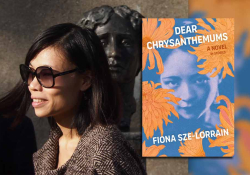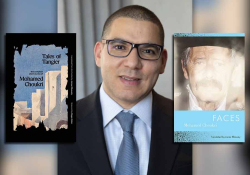The Wealth of Strong Poetry: A Conversation with Ruth Stone

Although it’s been nearly twelve years now since Ruth Stone died on November 19, 2011, I’m struck by how profound, poignant, and moving her answers to the following questions still resonate as timeless reflections on her long, bittersweet life as a poet, mother, survivor, and widow. I had also interviewed Ruth in 2007, which turned into more of a conversation, and which I published in a book of interviews with other senior poets (Galway Kinnell, Jack Gilbert, Maxine Kumin, Lucille Clifton, Robert Bly, and Donald Hall) titled Sad Friends, Drowned Lovers, Stapled Songs (Marick Press, 2011). I felt, however, that I had only touched upon Ruth’s life and work in that first interview, so I continued to visit and talk with her at the house of her daughter, Marcia Croll, in Ripton, Vermont, for the next two years. I became especially interested during this time in just how Ruth’s “flood subjects” (the phrase Emily Dickinson used to describe her subject matter, particularly “immortality”), poverty, family, poetry, survival, “the good old boys club,” religion, and grief influenced her poems. Bedridden and 90 percent blind from a botched lasik surgery operation, Ruth spoke freely about her losses, the po biz, Walter Stone, her daughters, politics (she cast especially strong aspersions on Donald Trump and Rupert Murdoch) and the one question that haunted her until the day she died: whether or not she would be remembered as a “great poet.”
I felt honored indeed to carry on my two-year-long conversation with Ruth, which continues to play in my head as snippets that combine wisdom, humor, stories, and stunning poems that Ruth could recite from beginning to end with only the prompt of a first line.
Since 2009 the filmmaker Nora Jacobson has worked on a film of Ruth’s life, just completed, titled Ruth Stone’s Vast Library of the Female Mind, which will be shown nationally on PBS in 2023 and has already become an “official selection” of many film festivals, earning both national and international acclaim.
These last interviews with Ruth Stone took place over the spring and summer of 2011.
* * *
Poverty, Marriage, and Walter Stone
Chard deNiord: Good morning, Ruth. I’d like to continue our conversation by talking about the influence poverty has had on your poetry. You’ve lived with it as a reality and a theme that runs throughout your poems as a spiritual paradox that yields personal and artistic wealth. You’ve written two books, titled Cheap and Second Hand Coat, that focus on such subjects as single parenthood, surviving as an itinerant professor for years on a paltry salary, living in a house with no potable water in the winter in rural Vermont, and raising three daughters on pretty humble means.
In your poem “Bargain,” poverty itself answers your question, “Who will have me?” by saying, “I will.” This answer contradicts the American dream of attaining wealth and fame that even many poets strive to attain. Several eminent poets, many of whom are less eminent than you, make sizable salaries in their university positions. Wealth has never seemed all that important to you. In several poems in Cheap and Second Hand Coat you address poverty, as well as your life as a single mother, with a strong feminine voice that transcends hardship and which you attribute to the women on your side of the family in your poem “Pokeberries,” especially in these concluding lines of the poem: “No amount of knowledge can shake my grandma out of me; / or my Aunt Maud; or my mama, who didn’t just bite an apple / with her big white teeth. She split it in two.

Ruth Stone: Well, the thing of it is, I had this absolute something; I would never owe anyone anything so I would never get anything unless I could pay for it right then, and I would never buy anything on time and so that limited me of course, but that was the way it was.
deNiord: But you never seemed to miss it. You are not unhappy that you are not living in a big house with a furnace and modern appliances.
Stone: I never wanted a big house. I never really wanted fame. Have you? Do you want fame? People who want fame have something missing inside, so things have to make up for it. I used to come home from the library just loaded with books. I read through the children’s library, as much as they let me, the high school library, the adult library, and read and read and read. That was my passion. That was my food.
deNiord: The great irony in your poem “Bargain” lies in your answer to your own question about who or what will have you, what specifically will possess you. When you respond, “I will, says poverty,” you seem to be making a double-edged reply that acknowledges your poverty but also your strength as a poet in poverty’s possession. You write in this same poem: “I was not ready for this world / Nor will I ever be / But came an infant periled / By my mother sea, / And crying piteously.” And then you write this about your father: “Before my father’s sword, / His heavy voice of thunder, / His cloud hung fiery eyes, / I ran, a living blunder.”
So, out of this fertile provenance for poetry—peril, woe, fear, and blunder—you pursued an austere career as a poet, searching for an intangible wealth in words. In the lines that follow those above, you acknowledge this metaphorically: “After the hawker’s cries, / desiring to be shared, / I hid among the flies. // Myself became the fruit and vendor. / I began to sing, / mocking the caged birds. / I made my offering // Sweet cream and curds . . . / Who will have me?” This poem reads as an ars poetica as well as a succinct poetic memoir.
Stone: I think I am pretty wealthy. I’ve been very rich. I have books all through the world.
deNiord: And look what you’ve accomplished as a poet while raising three daughters under the duress of poverty.
Stone: I don’t know, but I guess it’s okay.
deNiord: Better than okay, Ruth. There is what you might call an American irony to your life—your attainment of another kind of American dream that isn’t based on monetary wealth but the wealth of strong poetry.
Stone: I am sure it is the same with you, isn’t it?
deNiord: Well, yes, but I am amazed by the success you’ve achieved as a poet despite your poverty and personal loss, living from one itinerant teaching job to the next while trying to raise a family as a single mother at the same time and hold onto your house in Goshen. I have been very fortunate compared to you. Not to mention also the terrible loss you suffered when your husband, Walter, ended his life in 1958, soon after the well-received publication of your first book, In an Iridescent Time.
Stone: I only loved Walter, and you know, when I met Walter I was married to someone else.
deNiord: You were married to a chemical engineer named John Clapp.
Stone: Yeah. Perfectly nice man but . . .
deNiord: But you weren’t in love.
Stone: No. When I married him I thought I had loved him. But then I remember at one point he did something that killed my love for him. Well, that is not real love when it can be killed like that. I was just a kid.
deNiord: How old were you?
Stone: We got married I think when we were eighteen.
deNiord: You were married to Walter for about eleven years, from 1946 to 1959, before he tragically committed suicide while you were both living in Cambridge, England, during his sabbatical year from Vassar College. You mentioned to me that he left a note for you before leaving for his office in London the day he died that read, “Is this all there is?” Perhaps he was feeling inordinate pressure as well as despondency over the lack of progress he was making on his novel he was under contract with Doubleday to complete during his sabbatical. He had just experienced quite a bit of professional and literary success, publishing his first book of poetry and securing tenure at Vassar.
Stone: It was my fault I didn’t save him.
deNiord: It wasn’t your fault, Ruth. He wasn’t honest with you about the way he was truly feeling.
Stone: That’s right. He wasn’t. And that awful editor at Doubleday who was pressuring him to finish his book. Much of it was his fault.
deNiord: You can’t blame yourself. Walter needed to tell Doubleday to back off, the way you’ve told people to back off when you need to.
Stone: That’s true.
deNiord: You could do that, but he couldn’t.
Stone: I had to live with it all these years. I wanted to kill myself for a while after we returned from England, but Dr. Mowbray in Cambridge, Massachusetts, saved me by reprogramming me. He made me go home and listen to myself. I changed then from obsessing about killing myself to wanting to live. He said I was the only patient he had ever had who was able to do that.
deNiord: You also started to write again.
Stone: Yes, shortly after that, I did. I didn’t have suicide in me.
deNiord: You commented that you loved the world and yourself too much to kill yourself in the filmmaker Sidney Wolinsky’s short film he made about you called The Excuse. “Suicide is an act of self-hatred,” you also remarked.
Stone: I did, the trees, the birds, the clouds . . .
deNiord: And the universe.
Stone: Yes, the universe.
deNiord: I’ve always wondered what you’ve found so especially fascinating about the universe.
Stone: I don’t know, but I always have, though, ever since I was a child. It’s where my poems come from—from way out there, and then right through me.
deNiord: But you don’t feel religious about it.
Stone: It’s just that we’re so small, smaller than a molecule when you think about it, and then we’re on the molecule. Andromeda’s getting closer and closer, even though it’s millions of light years away.
Andromeda’s getting closer and closer, even though it’s millions of light years away.
deNiord: So it’s the mystery of it that beguiles you.
Stone: The curiosity. How could someone who loves the world want to kill themselves?
deNiord: But there are some who do.
Stone: They’re depressed.
deNiord: Perhaps Walter was depressed.
Stone: No, Walter never suffered from depression—periods of insanity, but not depression.
* * *
Women, Men, and Poetry
deNiord: It’s a shame that most of the men of your generation didn’t read women poets.
Stone: That’s true, they didn’t. But women read everybody.
deNiord: They were much more open-minded.
Stone: Oh, God, yes.
deNiord: So women are superior to men?
Stone: I’m afraid so. Men are more rigid; they have to be. Nature made them that way. Think about the penis.
deNiord: What about it?
Stone: If it’s not rigid, it’s not any good. Same with everything else about them—the way they run the government, business, the military. Women are the life-bearers. They raise the children.
deNiord: So they’re superior but don’t get any credit.
Stone: Unfortunately, that’s true.
deNiord: You capture this sentiment boldly and comically in your poem “Male Gorillas”:
At the doughnut shop
twenty-three silverbacks
are lined up at the bar,
sitting on the stools.
It's morning coffee and trash day.
The waitress has a heavy feeling face,
considerate with carmine lipstick.
She doesn't brown my fries.
I have to stand at the counter
and insist on my order.
I take my cup of coffee to a small
inoffensive table along the wall.
At the counter the male chorus line
is lined up tight.
I look at their almost identical butts;
their buddy hunched shoulders,
the curve of their ancient spines.
They are methodically browsing
in their own territory.
This data goes into that vast
confused library, the female mind.
Stone: I’m a woman. That’s why I’m in obscurity, that’s one of the reasons! Guess who runs the world? Guess who runs everything? Men, darling! Men! And men will only allow women what they want them to run, you know, and they won’t allow an old woman anything, anything!
deNiord: But you know, Ruth, your poetry, your voice, your life force transcend misogyny with feminine strength and humor.
Stone: Oh, thank you, dear heart, that’s very generous. You know, I never thought of myself as a poet. Never!
You know, I never thought of myself as a poet.
deNiord: Because?
Stone: I don’t know. I just never did! I never thought about that, and not only that, I never read any poetry.
deNiord: When you were a child, your mother read Shakespeare and Aesop’s Fables to you.
Stone: She did read Shakespeare and Tennyson. She loved his work.
deNiord: I hear their influence on your work in poems like “The Magnet,” “In an Iridescent Time,” and “The Tree.” Your muse has a complex voice that’s both grievous and humorous, both contemporary and classical. You write in spare, often haunting free verse, as in most of your poems after your first book, In an Iridescent Time, which is beautifully formal. After Walter died, you shifted to a less formal style, beginning with Who Is the Widow’s Muse? in the early seventies.
Stone: I thought I didn’t have any influences. When I was a child, very young, I would hear them—poems coming toward me from way off. I wouldn’t hear it, I would feel it, and it would come toward me and if I didn’t catch it, if I didn’t run in the house and write it down, it would go right through me and right back off into the universe, so, I’d never see it again, never hear it again. I’ve lost 99 percent of my poetry this way. They’ve gone through me like that and I’ve never been able to catch most of them. I have to say I never thought they were mine. They weren’t mine. They belonged to someone else, or somewhere else. They weren’t mine!
deNiord: So, you feel as if you were a cipher?
Stone: Now, that’s not true of all my work. Some of my work I have worked on, and as a matter of fact, once, when I was at Radcliffe’s Institute for Independent Study, many years ago, they wanted me to give a talk to the institute on my work and I told them what I’m saying to you, that it was just instinct. I’m messy. I throw everything in boxes so bills and everything else would be mixed in with the poetry.
deNiord: Poetry in with your bills?
Stone: I found a bunch of poems. I would have fifteen, sixteen pages of revisions, revisions, work, work, changes, changes, changes . . . so I worked on poems. I remember one poem, “Things I Say to Myself While Hanging Laundry.” I was out in the backyard in Goshen, hanging laundry, and the poem began coming to me and I just went on hanging the laundry, and I said to myself, “Oh! I’d better get this down.” And so I ran around to the front of the house because I couldn’t get in the back door. I ran around to the front and up to my room and wrote it down as fast as I could. I couldn’t get the last line for years. Finally, I got the last line, but it was the darndest thing, because it starts with an ant crossing the clothesline. I watched it. The poem starts like this: “If an ant crossing on the clothesline / from apple tree to apple tree, / would think and think, / it probably could not dream up Albert Einstein.” It goes on from there:
deNiord: (reading while Ruth accompanies me reciting) “Or even his sloppy mustache; / or the wrinkled skin bags under his eyes . . .”
deNiord & Stone: “. . . that puffed out years later”
Stone: “. . . after he dreamed up that maddening relativity.”
deNiord & Stone: “Even laundry is three dimensional. / The ants cross its great fibrous forests / from clothespin to clothespin / carrying the very heart of life in their sacs or mandibles, / the very heart of the universe in their formic acid molecules.”
deNiord: It continues on so fluidly from there.
Stone: (reciting)
And how refreshing the linens are,
lying in the clean sheets at night,
when you seem to be the only one on the mountain,
and your body feels the smooth touch of the bed
like love against your skin;
and the heavy sac of yourself relaxes into its embrace.
When you turn out the light,
you are blind in the dark
as perhaps the ants are blind,
with the same abstract leap out of this limiting dimension.
So that the very curve of light,
as it is pulled in the dimple of space,
is relative to your own blind pathway across the abyss.
And there in the dark is Albert Einstein
with his clever formula that looks like little mandibles
digging tunnels into the earth
and bringing it up, grain by grain,
the crystals of sand exploding
into white-hot radiant turbulence,
smiling at you, his shy bushy smile,
along an imaginary line from here to there.
Now, that poem just poured out of me. Do you like that poem?
deNiord: Oh, I love that poem.
Stone: That last line, “along an imaginary line from here to there” was the one I had to wait years for. Isn’t that funny?
deNiord: Yes. Well, I love what you say in another poem: “I’m going toward something. I’m complicated / and yet how simple is my verse.” You are full of contradictions in many of your poems, knowledgeable, sophisticated, wise, lucid, but then often concluding in complete submission to the vanity of writing. You call it “yipping” in one poem and “being swept away” to “the schizophrenic night” in another, in which you wonder, “What’s it all for? Why am I doing it?” You also titled one of your books Simplicity.
Stone: You feel the same way?
deNiord: Yes, but it’s so pronounced in so many of your poems—a bittersweetness that emanates from both your grief to an overwhelming feeling of vanity. “What’s it all for?” you ask. “Why am I doing it?”
Stone: Well, you know what am I trying to say is that not very many people really like poetry anymore. It used to be the troubadours. They were the news carriers. Where are they now? Now we have television and radio and the internet. We don’t need poetry anymore.
deNiord: So, why did you start writing poetry in your youth?
Stone: I’ve always written—I’ve always made poems.
deNiord: Instead of, say, fiction or prose.
Stone: I have written fiction! I’ve had it published.
deNiord: Oh, really?
Stone: I have written a lot of fiction and published some of it Commentary and the New Yorker. The New Yorker was just dying for me to write fiction for them. So, why didn’t I? My short stories came the same way as the poetry—line by line. It’s as if they were dictated to me.
deNiord: You are a cipher.
Stone: A what?
deNiord: A cipher. Someone who receives dictation from her muse, which is, as you’ve said, is the universe.
Stone: Yeah, that’s something.
* * *

What Love Comes To was a finalist for the 2009 Pulitzer Prize.
New Poems, Science
deNiord: You included ninety-three poems in your last book, What Love Comes To. Which is also how old you are, ninety-three.
Stone: I wasn’t aware I did that. When did I write them?
deNiord: Pretty recently.
Marcia Croll (Ruth’s oldest daughter): In the last eight years.
deNiord: I’m fascinated by the way you mix your mystical belief in the universe as your muse with your love for physics and science.
Stone: Oh yeah, I was always crazy about science. The great scientists are really poets, aren’t they?
deNiord: Your poems about Einstein and Mandelbrot betray your love of science and scientists.
Stone: But I never read poetry.
deNiord: You never read poetry?
Stone: I’ll tell you why I didn’t. I didn’t want to write like anyone else. And I didn’t want to be influenced by anyone else. I deliberately did that. I did, I remember doing it! I would refuse.
Croll: You have two people here. You have somebody who was highly intelligent and talented and could explain herself very well and somebody who really understood the science that she writes about. And then you have the person, the poet. And she’s a different person. I see you trying to get something from her, and you’re going to have to guess. Because my sisters and I used to think she was two people, and I’m not saying schizophrenic or split personality, the person who wrote those poems is totally innocent of the rest of things. And, I mean, they’re about her life.
Stone: She’s talking about her mother!
deNiord: She’s talking about you!
Croll: I think we always thought her poems came from outer space. We always did. All three of us—me, Phoebe, and Abigail. Because, well, she’s great the way she is without the poetry coming to her, but the poetry comes from somewhere else that we can’t see.
Stone: But I’ll tell you something else: mathematically I’m no good! But it’s the darndest thing about music. I could do it, I could do the piece, but I couldn’t read it!
deNiord: There are lots of musicians who can’t read music, like Paul McCartney, yet they can create beautiful music.
Stone: It’s weird.
deNiord: You sang all those beautiful songs with your granddaughters at the state house when you were installed as poet laureate of Vermont by Governor Douglas.
Stone: I said to him, “You know, I’m a Democrat!” And he said, “Not to worry.”
deNiord: Galway Kinnell was there also.
Stone: Isn’t he dear?
deNiord: Yes.
deNiord: He absolutely is. So, speaking of music, when I visited you the last time, I said, “Ruth, do you think of music first before you write your poems?” You often start your readings with songs. And you said, “Well, you know, I kind of think back. I had a mother who sang all the time.”
Stone: That’s right. And my dad played the drums! Can you imagine? There I was with a mother who sang and a father who played drums.
deNiord: You wrote a poem about this called “Rhythm,” which is in your book Cheap, part of which goes:
I am the drummer’s daughter.
He beat time out of me.
Rat-a-tat-tat
Rat-a-tat-tat
In Norfolk on the sea.
Young he was and handsome.
A gambler, by G.
I was his first-born daughter.
He rolled the dice for me.
deNiord: And your mother read poetry to you.
Stone: I sat on my mother’s knee listening to her read Tennyson. But you know, that may be my imagination. I wonder if she read it out loud and sang it, too. I don’t know, but I thought she did.
deNiord: You once told me you that you aspired to write “like no one else.”
Stone: That’s right! I didn’t want to sound like anyone else. So I wouldn’t read any current poetry. I refused to read it.
deNiord: Plus, you were growing up in a time when men mostly dominated the poetry world.
Stone: I guess they did. I didn’t even realize it. God, you should’ve lived during that time! Or maybe you did!
deNiord: I was born in 1952.
Stone: Oh no, you didn’t.
* * *
Walter and Memory
deNiord: You’ve written so many moving poems about your husband, Walter. The details in these poems loom large in your memory as well as cross over to your reader in such a generous way that readers feels the intensity of your love as well as your grief. I think, for instance, of your poem “Against Loss,” which not only invites your reader in but also back again and again.
Against Loss
That time at the Downbeat: Billie Holiday
Oh nothing succulent and sweet anymore.
We drank so much. This was before the war
when we were renting rooms for the weekends;
and you watched me brush my hair.
tickling your long fingers down my back.
I sometimes hear the trombone and sax and drums,
the wobble of spinning glass above the Ladies Room
where she was upending a little toss
of medicine out of a bottle.
I mean, Billie Holiday spoke to me down there.
She said, “I’ve got a bad cough” like
an apology, and I remember her.
Memory becomes the exercise against loss.
Later when we were naked in bed,
and that tremble of heat lightning along the muscles,
you began the slow measures of “Dover Beach”
in the only voice—the only voice—
”Ah love, let us be true to one another.”
Stone: Oh yes, when we were just lovers.
deNiord: This is such a bittersweet poem. Do you feel memory serves more as an exercise against loss than as a grievous reminder of it?
Stone: Yea, but I have that. Yet in a way I don’t have it. You see, it’s in me. It’s part of me.
deNiord: It’s not against grief, it’s against loss.
Stone: Oh, I grieve.
deNiord: In a more recent poem titled “Mantra,” you write:
When I am sad
I sing, remembering
the redwing blackbird’s clack.
Then I want no thing
except to turn time back
to what I had
before love made me sad.
When I forget to weep,
I hear the peeping tree toads
creeping up the bark.
Love lies asleep
and dreams that everything
is in its golden net;
and I am caught there, too,
when I forget.
deNiord: When you forget your grief.
Stone: It’s a part of me. I’m actually a comic poet.
deNiord: In your poem titled “Memory,” you write: “Can it be that memory is useless / like a torn web hanging in the wind / sometimes it billows out a full high gauze— // like a canopy. // But the air passes // through the rents / and it falls again and flaps / shapeless / like the ghost rag that it is— / hanging at the window / of an empty room.”
Stone: I wrote that very recently.
deNiord: It’s on the back of your new book, What Love Comes To.
Stone: Yes.
deNiord: People have sent in their list of poems they’d like to read at the event in honor of you at the Poets House in New York City. I’d like to read your poem titled “Poems.”
Stone: Read it now.
deNiord:
Poems
When you come back to me
it will be crow time
and flycatcher time,
with rising spirals of gnats
between the apple trees.
Every weed will be quadrupled,
coarse, welcoming
and spine-tipped.
The crows, their black flapping
bodies, their long calling
toward the mountain;
relatives, like mine,
ambivalent, eye-hooded;
hooting and tearing.
And you will take me in
to your fractal meaningless
babble; the quick of my mouth,
the madness of my tongue.
Stone: That was about the ocean and Walter.
deNiord: Yes.
Stone: I never made anything up. Oh, God! You’re making me cry! You know, I never thought of myself as a poet. Never!
2011










